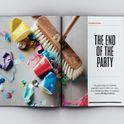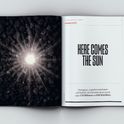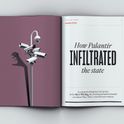Known unknown
The implicit assumption of Bill Emmott’s excellent piece is that the radical uncertainty that we now face is something new. I would contend, instead, that such radical uncertainty has almost always been with us: it is a standard condition of human activity.
What was so unusual was the calm, successful and largely predictable conditions we became accustomed to in the period after 1990. These were NICE years (former Bank of England governor Mervyn King’s term for “non-inflationary continuous expansion”). Besides economic growth taking millions of people out of poverty, it was a period of general political stability and relative certainty. With the fall of the USSR, the US seemed not only the undisputed economic power but could also be relied upon to wield that power in a responsible way.
Humanity normally lives in conditions of radical uncertainty. Consider the Cuban Missile Crisis in October 1962, when the world was even closer to disastrous nuclear war than now. And this was shortly followed by JFK’s assassination. The 1970s were a horribly disturbed decade; and what must it have been like to live in the interwar period, with dictators in the ascendant and the Great Depression ravaging the world economy?
In our own time, the rise of China has threatened the tranquillity of the established order. US hegemony has been undermined by populism such as we saw in the Trump years. It is not so much the barbarian autocrats at the gate, but internal dissension within the US and Europe that we most need to fear.
And then there are the challenges that Emmott hardly mentions. After 40°C heat in London this summer, climate change must surely be a worse threat even than Putin, plus there is my own concern about how we will cope with an ageing population and a birth rate falling well below the sustainable level. While this may help slow the depletion of the Earth’s resources, a rise in the dependency ratio—with a far larger number of retired elderly citizens, many suffering from neurodegenerative diseases, relative to a declining workforce—will cause massive political and fiscal problems.
Charles Goodhart, emeritus professor, LSE
Bill Emmott writes that “we are in an age of radical uncertainty.” I am not so sure, but I imagine that proves his point.
Brendan Kelly, Dublin
Rejoin and remodel
A very interesting piece by Malcolm Rifkind, one of the ever-dwindling band of “good conservatives.” I would take issue with just two points.
First, I believe that the question of our possible re-entry to the EU single market and customs union is not as definitively closed off as Rifkind claims. It is already widely accepted that the whole process of Brexit has been damaging for the country, its economy, its reputation and its social cohesion. I would not be at all surprised to see a swelling movement wanting to rectify that damage. Indeed, it is hard to understand how such patently honourable people as Rifkind, or Keir Starmer, can accept a state of affairs which they know is damaging the country they love.
Second, Rifkind proposes replacing the House of Lords with a senate of the four nations, its members appointed “solely on grounds of merit, untainted by political cronyism or fundraising.” I just don’t see how that could work. Everyone is encumbered by political baggage of one sort or another and no one, however wise and however distinguished in their own field, is immune from political influence. While acknowledging its weaknesses, I do think the House of Lords provides some balance to the Commons and, in fact, does its job rather well.
Christopher Barton, via the website
Remodelling the House of Lords as the senate is a long-overdue democratic reform. In my native Australia, the Senate is the states’ house. Each of the six states (regardless of population and physical size) elects 12 senators, and the two territories (the Australian Capital Territory and the Northern Territory) each elect two of their own. In the US, each of the 50 states elects two senators.
In the case of the UK, we would divide the UK into about 10 large districts, giving Scotland, Wales and Northern Ireland a greater representation than deserved by population, and the same for northern England—practical levelling up, to counteract the dominance of London. We would then elect 10 (or so) senators for each district, based on party lists.
Michael Hough, via the website
Loosening ties
My parents both arrived as refugees, and they maintained a lifelong gratitude to the UK as a place of decency and admirable liberal values. Like Mark Damazer we almost never encountered English food growing up, but in all other respects my sister and I were taught to admire and respect the traditions of this country, which had offered a haven.
And like Damazer I also remember Churchill’s funeral as a landmark event in our household, although I was very young. My father arrived on the Kindertransport from Berlin in 1939, and by 1944 he was part of the army that liberated Europe. His German nationality was stripped—as from all other Jews who had fled the country—in 1941, and after he was demobbed he became a naturalised and proud UK citizen. It would never have occurred to him to request a German passport, but then he died in 2016.
Times have changed. It’s not just Brexit; the contortions of patriotism and Britishness have felt different these past few years. As a result, and with some misgivings, I used my father’s heritage to request restoration of German citizenship under Article 116 of the country’s Basic Law (available to anyone, including their descendants, who had it removed by the Nazis). I have no intention of relocating to Germany, but I now have a burgundy passport again.
Long before 2016, my father used to shudder when Nigel Farage appeared on screen, but it was the crude dissembling of national identity under Boris Johnson which made me re-evaluate things. I am confident that under current circumstances my father would understand—and maybe even applaud—my desire to be once again part of a European project.
Suzanne Franks, City, University of London
Like Damazer, my ancestry is not British. As someone born in Scotland to Scots-born parents, and with two Irish grandfathers and both grandmothers of mixed Irish and Scottish ancestry, I have never in my 69 years even once felt “British.” Rather, I share with most contemporary Scots a feeling of “Scottishness.” In an article entitled “The meaning of Britain,” neither Scotland nor Wales get a mention—though Ireland, a foreign country, does.
Damazer tells us that although there are diverse “versions of Britishness,” there was a “national mood of sorts” around Diana, the London Olympics and the Platinum Jubilee. Not where I live there wasn’t! And apparently “three quarters of us have a positive view of the Queen.” Not in Scotland, where barely 45 per cent support the monarchy.
What Damazer has written is a very good article on “the meaning of Englishness.” He thinks England is Britain, which I hope in the very near future will be the political reality.
John O’Dowd, Lanarkshire
Telling off
Rory O’Kelly’s assertion that the purpose of independent schools is “to make [pupils] look exceptional” must not go unchallenged.
Independent schools in the UK are extraordinarily diverse. Many make no effort to “polish” their pupils and care little for Oxbridge entry; some, indeed, proudly support academically challenged children.
What all independent schools have in common is the purpose of educating children in a way that is directly accountable to parents and not directed by the state. Those who work in them or send their children to them share, implicitly, the belief that the state does not necessarily know best about education, should not have the monopoly of it, and that it should be possible to choose an alternative. The vast majority, happily, also believe that choice should be extended to those who cannot afford to pay the fees themselves.
This is not “investment,” still less “social engineering.” It is freedom of choice.
Chris Ramsey, headmaster, Whitgift School
In his Diary musings, Eton headmaster Simon Henderson reflects that “Our national education system is critical to the future of our society” and waffles about the “wisdom of youth” and the “need to balance the old and the new.” No mention of his school’s 40 football fields and 19 cricket pitches, or of the £46,000 annual parental outlay.
Private education, especially boarding school education, is a legacy of British colonialism that compounds inequality and is demonstrably harmful to many children’s mental wellbeing. Countries like Finland that ban school fees have better educational performance and social mobility outcomes.
The government trumpets its “levelling-up” agenda, but Britain will never level up and never harness the talents of all our young people if opportunity has to be paid for in private school fees. Places like Eton have never been less relevant.
Mary Verdult, Malvern
Making misery
Richard Murphy’s column was bang on. I’m not paid to have the answers—that privilege is reserved for others, whom I expect to understand the economy better than I do. Why, then, with my modest degree in economics, is it so obvious to me that all raising interest rates will achieve is much misery without any discernible impact on inflation?
This is not inflation created by random consumption but the greed of a privileged handful. There is no “choice” over food—you eat or you starve. There is no choice over heating your home—you’re warm or you’re cold, and for many being cold is not just uncomfortable, it is life-threatening.
Raising interest rates to control the consumption of largely essential services shows a complete lack of imagination, compassion or comprehension on the part of the Bank of England, reinforced by the policies of an intransigent and largely absent government whose cruelty and fanaticism reverberate through all that was once decent about the UK— and not in a good way.
Susan Dunstall, via the website
Think harder
I am not sure the majority of the people on your list can be called “thinkers.” Journalists, yes; writers, yes; rappers, yes. But to me, being a thinker implies unusual depth of thought, saying something that makes us understand the world in a novel way. Most of these people are not that, although they are very accomplished individuals and leaders in their field.
Jade, via the website
Writing it down
I find it surprising that anyone can claim a codified constitution would be a remedy to our problems. Some of the most egregious charges against Boris Johnson were that he intentionally misled parliament during the Partygate affair and that he evaded the mechanisms of accountability. Yet the political constitution ensured that when the tide turned against him, his own ministers were able to secure his resignation within 48 hours, without the need for any longwinded impeachment process. And, even though he has stepped down as PM, Johnson is still subject to an investigation by the Privileges Committee, which could potentially see him suspended from the House of Commons and subjected to a recall petition in his Uxbridge constituency.
As Jonathan Sumption notes, plenty of countries with entrenched constitutions have suffered bad behaviour by populist leaders, including the United States (Donald Trump) and Italy (Silvio Berlusconi). A written constitution is not a panacea. It would potentially drag the judges further into the political arena as they would have to determine ever-more political questions—not something to be welcomed.
Even if you accept that we are so much wiser than our forebears that our society is now in a place where we might wish to entrench certain rules, it is hard to see how one would reach consensus in such a polarised nation as ours. Rather than tilting at windmills in a quixotic quest for perfection, we might do better to consider how we can pragmatically improve our political culture to resist the blandishments of rogues and mountebanks.
Alexander Horne,barrister and visiting professor at Durham University
Error of judgment
In answering one of the questions for Brief encounter—What have you changed your mind about?—the historian Antony Beevor says he sometimes judges people too instinctively, finding that someone he considered a bore is in fact very interesting. This discovery—and its opposite, whereby someone perceived as interesting turns out to be a bore—has often been my experience.
I believe anyone is alternately very interesting or very boring depending on circumstances, and if given enough opportunity to be either or both. The very worst thing, though, is intentionally or apathetically never bothering to find out.
Stefan Badham, Hampshire
In fact:
When asked: “How many holes are there in a straw?”, 54 per cent of Britons said one, 42 per cent said two and 4 per cent didn’t know.
YouGov, 11th August 2022
In the US, around 200,000 children have lost a parent or caregiver to Covid.
New Yorker, 13th July 2022
Since its founding in 1958, the Institut des Hautes Etudes Scientifiques in France has had 12 permanent professors of mathematics, eight of whom have now won a Fields Medal, the subject’s equivalent to a Nobel Prize.
Ars Technica, 18th July 2022
John Major’s Conservatives received 14.1m votes in the 1992 general election, more than any other party in British political history.
@PoliticsMoments, 28th June 2022
The Turkish word for breakfast, kahvalti, can literally be translated as “before coffee.”
Gogastronomyturkiye.com
Over the next decade, there’s a roughly 10 per cent chance that debris from rocket launches and landings will kill someone on Earth.
Vice, 11th July 2022
In the year since Pedro Castillo was sworn in as Peru’s president, he has had to make more than 50 changes to his cabinet.
AS/COA, 27th July 2022
The most searched-for song on Shazam is Tones and I’s “Dance Monkey,” which over 41m people have asked the app to identify.
NME, 22nd August 2022
This summer, the world’s most-delayed airport was Toronto Pearson, with 52 per cent of all flights experiencing a delay.
National Post, 11th August 2022
In the 1900s, blackcurrants were federally banned in America because the non-native plants carried a wood-destroying fungus. The ban has been lifted but the fruit is mostly unknown and purple Skittles—blackcurrant in the UK—are grape flavoured in the US.
Tasting Table, 7th June 2022












